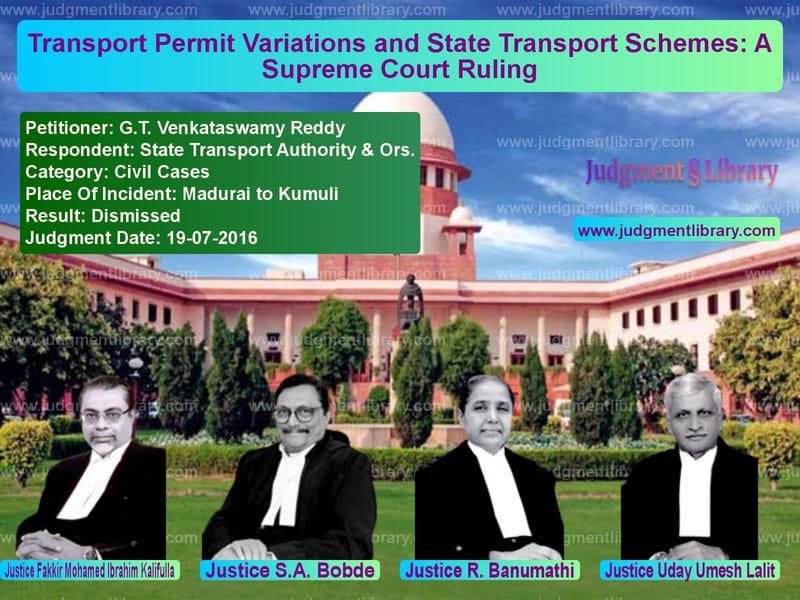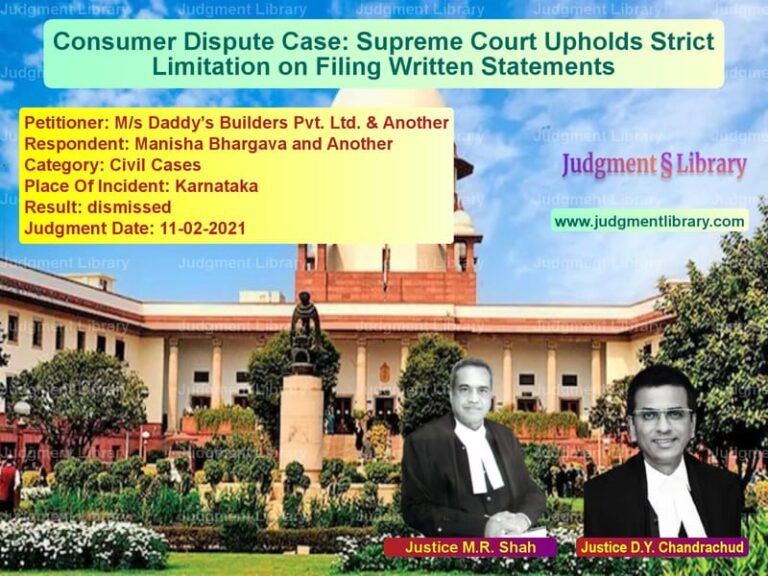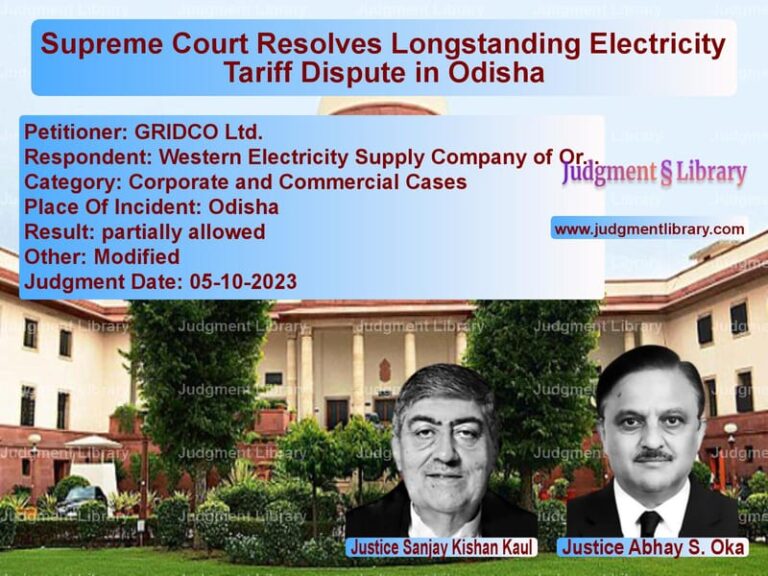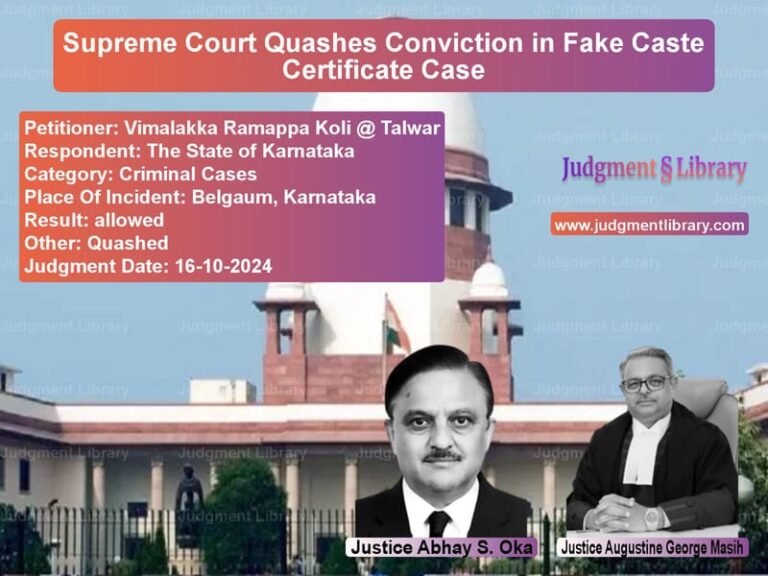Transport Permit Variations and State Transport Schemes: A Supreme Court Ruling
The case involves the interpretation of transport permit regulations under the Motor Vehicles Act, particularly in relation to the nationalization of transport routes in India. The Supreme Court of India was tasked with clarifying the legal standing of permit variations and how they impact the overall transport structure and operation in the country.
Background of the Case
The dispute arose from the attempt by private bus operators to increase the number of vehicles operating under a state-run transport system. The petitioners argued that the existing transport permits, granted for specific routes under the State Transport Authority’s guidelines, allowed for variations to be made to increase the number of buses operating on those routes. The respondents, including the State Transport Authority, opposed this, arguing that such variations violated the nationalization schemes and the limitations imposed by the Motor Vehicles Act.
The petitioners sought clarification from the Supreme Court regarding the possibility of increasing the number of buses and varying the terms of existing transport permits, as allowed under the Motor Vehicles Act. The legal issue was whether such variations should be treated as new permits and whether they could be permitted without violating the nationalization requirements of the routes.
Key Issues Considered
- Can transport permits be varied to increase the number of buses on nationalized routes?
- What are the legal implications of variations to existing transport permits under the Motor Vehicles Act?
- Do variations of permits violate nationalization provisions under the Act?
- Should variations to transport permits be treated as new applications for permits?
Petitioner and Respondent Arguments
The petitioners, who represented private bus operators, contended that variations to transport permits should be allowed to accommodate the growing demand for public transport. They argued that the existing permits did not restrict them from increasing the number of vehicles operating on approved routes, and that such variations would help serve the public interest.
On the other hand, the respondents, including the State Transport Authority, maintained that any variations to the existing permits should be treated as new permit applications. They emphasized that the Motor Vehicles Act contains provisions that govern the issuance of new permits and that such variations could disrupt the framework for nationalized transport routes.
Supreme Court’s Judgment
The Supreme Court examined the legal aspects of permit variations and concluded that while it is within the power of the Transport Authority to grant variations, such variations must comply with the overarching statutory framework. The Court made the following key observations:
- “The variations to existing permits should not disturb the fundamental purpose of nationalization of routes, which aims to provide fair and efficient public transport.”
- “The Motor Vehicles Act provides a clear framework for issuing new permits and altering the terms of existing ones. However, such alterations must align with the principles of fairness, public interest, and service efficiency.”
- “Any increase in the number of vehicles operating on a route should be considered in the context of existing schemes and should not violate the provisions for nationalization of routes.”
- “The issue of whether variations constitute a new permit application should be evaluated based on the specific context and impact on the public transport system.”
Analysis of the Court’s Decision
The Court’s decision was rooted in the interpretation of the Motor Vehicles Act and its provisions governing transport permits. Key points raised by the Court include:
- Nationalization of Routes: The Court emphasized the importance of maintaining the integrity of nationalized routes. Nationalization aims to ensure equitable distribution of transport services across regions and prevent monopolies by private operators. The Court held that variations to transport permits must not disrupt these objectives.
- Public Interest and Fairness: The judgment highlighted that while private operators are permitted to operate on nationalized routes, their operations must align with public interests. Allowing variations should be done in a way that does not harm the accessibility or efficiency of the transport system.
- Statutory Framework: The judgment made it clear that the statutory framework for issuing new permits applies equally to variations in existing permits. Variations, if allowed, must be done in a manner consistent with the rules governing new permits, including fair competition and efficiency in service delivery.
- Discretion of Transport Authorities: The Transport Authority was given discretion to assess the necessity of varying permits but was reminded that any decision must align with statutory requirements and public interest.
Key Directives by the Court
- Compliance with Statutory Provisions: The Court directed that variations in transport permits be made only after full compliance with the relevant provisions of the Motor Vehicles Act and after ensuring no violation of nationalization requirements.
- Public Interest Must Prevail: The Court instructed that any decision to grant permit variations must prioritize public interest, including factors such as population density, transport needs, and efficient use of resources.
- Application Process for Variations: The Court reiterated that while variations can be considered, they must undergo the same rigorous application process as new permits, including transparency and public consultation when necessary.
Implications of the Judgment
This judgment has significant implications for both private bus operators and state-run transport authorities:
- For Private Operators: The ruling ensures that private operators can seek variations to existing permits, but they must comply with the rules and regulations governing such changes.
- For State Authorities: The ruling gives state authorities the discretion to grant or deny variations to transport permits but requires them to consider public interest and fairness in their decisions.
- Public Transport Efficiency: The judgment aims to strike a balance between private operators’ rights and the broader goal of ensuring an efficient, equitable public transport system.
Conclusion
The Supreme Court’s ruling in this case reinforces the need to maintain a fair, transparent, and efficient public transport system, balancing the interests of private operators with the overarching goals of nationalized transport systems. The judgment emphasizes the importance of following statutory processes and ensuring that public interests are not compromised by variations to transport permits. It sets a precedent for future decisions regarding permit variations, offering a clear framework for evaluating the impact of such variations on the public transport system.
Don’t miss out on the full details! Download the complete judgment in PDF format below and gain valuable insights instantly!
Download Judgment: G.T. Venkataswamy Re vs State Transport Auth Supreme Court of India Judgment Dated 19-07-2016-1741873276478.pdf
Direct Downlaod Judgment: Direct downlaod this Judgment
See all petitions in Contract Disputes
See all petitions in Property Disputes
See all petitions in Environmental Cases
See all petitions in Judgment by Fakkir Mohamed Ibrahim Kalifulla
See all petitions in Judgment by S. A. Bobde
See all petitions in Judgment by R. Banumathi
See all petitions in Judgment by Uday Umesh Lalit
See all petitions in dismissed
See all petitions in supreme court of India judgments July 2016
See all petitions in 2016 judgments
See all posts in Civil Cases Category
See all allowed petitions in Civil Cases Category
See all Dismissed petitions in Civil Cases Category
See all partially allowed petitions in Civil Cases Category







